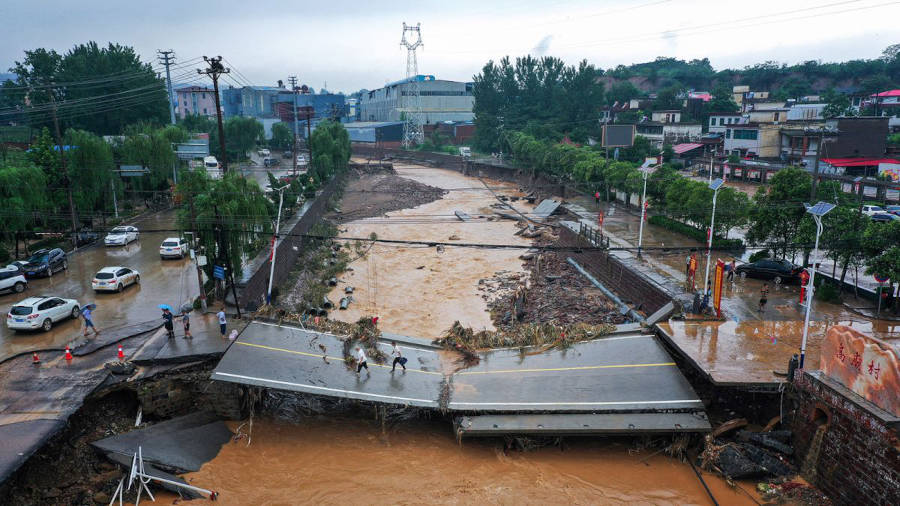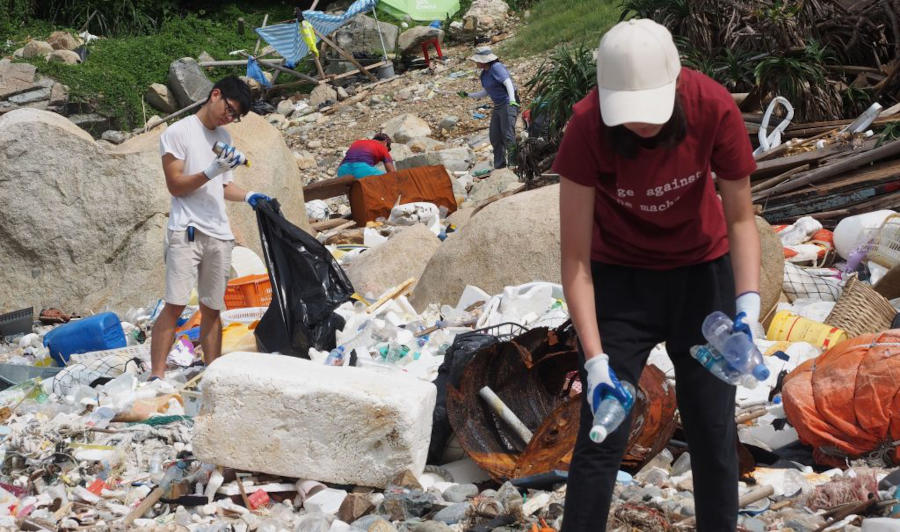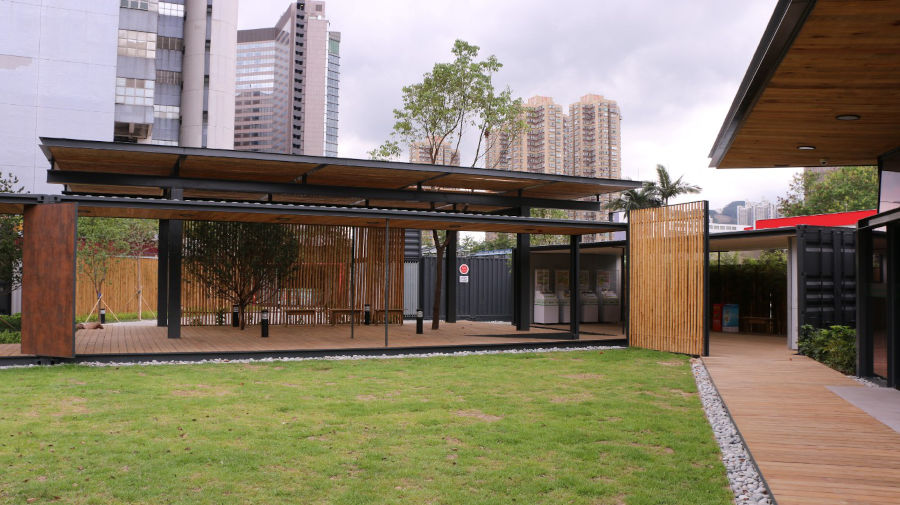Around 11,000 tonnes of municipal solid waste are dumped into Hong Kong’s landfills every day. Plastic accounts for 21% of this waste. In 2018, the recovery rate of plastic recyclables was at a mere 7%, down from the previous year’s 13%. Local environmental groups say change needs to happen quickly and go beyond recycling to exponential waste reduction. We spoke to 2009 Medal of Honour recipient and founder of sustainability NGO The Green Earth, Edwin Lau, about the plastic crisis and what more the government could be doing to speed up greening the city.
#1 – How have you seen people’s attitudes toward sustainability evolve in the last 10 years?
Some educated people and the younger generations hear more about the problems in Hong Kong and in the world, and are starting to change their own habits to address the problem, bringing their own reusable cups, lunch boxes, and bags. They understand that if they wait for the government, it could take ages. They want to contribute, not wait for someone to lead them. But there is only a minority that think there’s an issue.
#2 – Do you think the government’s plastic tableware ban projected for 2025 is a good step in the right direction or too little, too late?
When you look at other countries, there are many that already have this ban as a mandatory approach, such as the EU. In early July this year, they banned ten single-use plastic items. (The EU banned the 10 plastic items most commonly found on European coastal areas, including cotton-bud sticks, cutlery, plates, straws, and stirrers.) Other countries such as Mainland China and Taiwan banned foam boxes last year.
While in HK, we started to have the consultation this year. We are not saying we will ban single-use by 2021, the proposal is around 2025. It is quite ridiculous that there is such a long timeframe to enact a ban.
Just a few days ago, I read that Macau will ban plastic stirrers and straws in 2022. Macau and HK are both SARs of China, we are neighbours. How come Macau can do it next year, and HK another few years down the line? You cannot say HK is leading. We’re not even following, we’re doing catch-up. It’s no good in really dealing with the serious risk problem from single-use plastic.
#3 – If you were consulting the government, what would be the first sustainability issue you would address?
The critical environmental problems in HK are plastic pollution, waste management, and the climate change crisis. You can see precisely the heat wave, droughts, and flooding happening in many other countries. Not in HK, but we are also suffering from this climate risk. Observatory data in the last few months show a new record high for the number of hot nights and days. We’re keeping a higher average temperature this summer than previous years.

You see Zhengzhou had the heavy downpours in July that flooded the tunnels and took some lives. It’s not just subway services being suspended, it’s very serious. We are also in the South China area, no one can say that HK is immune. Are the million passengers going through our subway daily safe if there is torrential rainfall?
The government has not come out to say, “We have investigated if we have downpour of similar magnitude to Zhengzhou, we are able to pump away all the water in a short time, and it will not escalate to suffocate passengers.” As a responsible government, they should do a formal investigation and then come out and tell us. But I haven’t heard any of this kind of assurance. So these, the climate crisis, waste problems, and plastic pollution, are the very critical issues that we cannot take lightly.
#4 – How can we increase people’s sense of urgency about the climate crisis?
I keep writing in one of the main newspapers, South China Morning Post, to remind the public, big stakeholders, the government, managers in big corporations. I give talks about the environmental crisis that the city is facing right now, and tell them our actions can reduce the impact.
We also have a program where we take corporate employees to see the plastic debris left on hiking trails or beaches. They feel and see with their own eyes how serious it is. After doing a clean-up and waste analysis, they realize the most common type of waste left lying in the countryside is plastic bottles, food wrappings, and cutlery. They start to think, why are these left in nature and not in a bin?

They realize it’s because we as human beings use a lot during the day. And not all the things we use are being disposed in the right place, so then they are left to pollute nature. This exercise inspires them that the problem was created by all of us. Not by the fish, not by the tortoises, by human beings. So we should be the solution.
With our resources as a small NGO, we cannot do massive advertising for millions of people to see. We can only go one by one. It’s the government that has the resources to do massive public education and promotion. But I don’t see they are very keen or active in doing this. It’s sad. The one who wants to do it has little resources, while the one with lots of resources doesn’t really do it. It’s not balanced.
#5 – Does it ever feel hopeless? What can small NGOs hope to accomplish?
I can’t expect that 7.5 million people will change all in one go, so we start with companies and schools. We keep engaging more groups, sharing our analysis of these environmental problems and offering practical solutions. These are very down to earth. We’re not asking them to go to the moon and find another new living space. We have only one Earth. This Mother Nature, this Earth, is for us.
It is irresponsible to say, no problem, we’ve ruined this Earth, so we can go to the moon or Mars. This is weird thinking. I’ve never accepted this. We tell people that this is the place that provides your food, air, water, all the things we need. You should be a good caretaker so that future generations can enjoy clean water, fresh air, and food which is not contaminated by any heavy metals or plastic.
In the following years, we will keep getting more partners. Like a snowball growing, getting bigger and bigger. Then they can also inspire their own peers, spreading the message further. This is the ripple effect that we need to try to make ripple faster.
#6 – What more can people who are already vigilant about recycling and waste reduction do?
I always say to people, you need to know the five-level waste hierarchy. Recycling is at the fourth level, very low. The top level, the most effective, is avoid, then reuse, recycle, [recover], and disposal.
Instead of finding reliable bins to drop your recyclables, why not try to avoid buying the single-use bottled water? Start with your water, at least. Nowadays you see water refill systems in shopping malls and MTR stations. They’ve started having this because we keep on advocating for it.
Society is getting these environmental solutions, but not fast enough. We want it to be quicker. So when you think of how to reduce waste, remember the waste hierarchy. If you cannot do the actions at the top, if you buy a plastic lunchbox, slightly wash it after finishing it, and put it in a recycling bin.
And not just any recycling bin. The media has reported a few times about cleaners mixing recyclables with garbage. Find reliable government-funded NGOS like the Recycling Stations. They are manned by staff who check whether items are clean or not before accepting them. If you bring clean recyclables to these reliable channels, then you will have done your duty.
#7 – Are Recycling Stations the most reliable recyclers in the city, or are there others?
They’re the more reliable ones. There are many public three-colour bins, but I really can’t tell whether that is really reliable. There’s no proof, no data. Even the bins in shopping malls, you never know whether at the back, the cleaners have done it properly or not. No one knows, there’s just no information.
And even in residential areas, you need to ask the management office whether they really have a recycler come regularly. If they can immediately give you the name of a recycling firm and which day they come every week, then it’s very good. Do a simple test yourself. Go down to see how they handle the recyclables that you as tenants drop into the three-colour bins. It’s first-hand information.

If they cannot, then it’s not very trustable. If they say, don’t worry, we have someone take it away, and they can’t tell you the particular name of the recycler, I would be very suspicious whether it really goes all the way to a recycling firm or it’s the end of the channel, if they’ve just done it on the surface.
As a tenant, you have the right to ask the management office of your office or residential building and they should provide you with the true information. Just ask, there’s no harm asking. This is basic information that they need to provide.
The problem is we still do not have the waste charging law effective. (The waste charging bill was passed a week prior to the interview, on August 26th.) With the law, depending on how much waste you throw away, you need to pay government fees. Then the management office would really do true recycling to reduce garbage fees. But now, the fee still hasn’t kicked in.
#8 – Thoughts on the waste charging law?
The law was approved last week, but there’s no definite effective date. So in a nutshell, it is not an executable law. If there’s a contract or bill with no date, what is this? This is nothing, in my opinion. It’s still in a vacuum. The law is still in the superficial level. In reality, the government cannot charge you a dollar.
It’s a half-baked law, not a fully cooked law. This LegCo would not tell any effective date, and then 18 months from now, they might come up with some other reasons to reconsider the effective date. So I would say this is just a delaying tactic by this term of LegCo.

They have the authority to approve or reject a law, they have the authority to say that this is the time for the law to gazette. They cut their own hand. They say, let the next LegCo exercise the power. So you can see how responsible this LegCo is.
#9 – In your opinion, what is behind the reluctance to give a solid start date for the scheme?
I think they know the voters will not like to be charged by the government. But as a lawmaker, they should do things not for their own interest, but for the common good of the entire society. This is the problem thereby this legislation has dragged on for 16 years until approval last week. And even approval is not practical approval.
So you can see, the situation is very odd. I don’t think it would happen in Europe, the US or the UK. Even in China, the effective date of a law is very clear. Starting in 2019, all Shanghainese people need to separate their waste and put it in different recycling bins. (In 2019, Shanghai enacted a citywide waste segregation policy.) There are government officials watching you do this. If you do it wrong two times, you are penalized with a fine.
So there is a definite time and day when a law becomes mandatory. How come HK doesn’t have this kind of responsibility system? Right now it’s a handicapped law, on crutches or on wheelchairs.

Mr. Edwin Lau Che-feng is the Founder and Executive Director of The Green Earth, an environmental organization advocating resource conservation and zero-waste culture. He has been actively engaged in environmental protection work since the late 80s. During the period, he placed great concern on several pressing environmental topics, e.g. waste management, air pollution, climate change and energy conservation.
(This interview has been edited and condensed.)
Disclaimer: The opinions expressed in this publication are those of the authors and do not necessarily represent the views of The HK HUB.
Header image credits: Naja Bertolt Jensen via Unsplash




